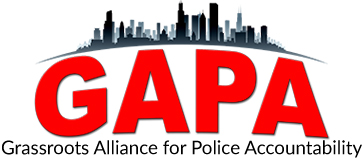The Grassroots Alliance for Police Accountability (GAPA), is a broad-based coalition of community organizations with deep roots in 30 wards across the city. GAPA is committed to engaging with individuals from these communities, particularly those most impacted by police abuse, misconduct and harassment, and to amplify their voices around these issues.
In November, we began a city-wide community engagement process, holding Community Conversations with residents throughout Chicago, to develop community driven recommendations for police accountability and structures to improve police-community relations. To date, we have hosted 19 meetings, engaging approximately 1,600 directly impacted community residents from Black, Latino, and other disproportionately impacted communities.
Today, after a yearlong investigation process, the Department of Justice (DOJ) presented their findings that further highlighted the disparities and poor policing practices of the Chicago Police Department (CPD). The seemingly overarching theme is that, “… CPD officers have engaged in a pattern or practice of using force, including deadly force, that is unreasonable, in violation of the Fourth Amendment.” A finding that for decades has been vehemently expressed, yet erroneously ignored, by underserved and disenfranchised residents in Chicago. At first glance, GAPA welcomes many of its findings and recommendations. We are confident that the report closely aligns with the findings of the Police Accountability Taskforce, a group commissioned by Mayor Rahm Emanuel to assess and provide reform recommendations for CPD. Further, we expect that the recommendations will reflect the thoughts, feelings, and experiences of the most vulnerable residents of Chicago as expressed in the hundreds of responses during our community conversation process.
While we are pleased with the steps that have been taken thus far to start the process of creating lasting, systemic change, we must stress that the only way these changes will become sustainable is to involve the voices and viewpoints of those who have been marginalized for far too long. As both the DOJ and PATF reports reflect, the implementation of a successful community oversight board is a necessary next step towards reform. GAPA is currently in the process of compiling a full report to highlight the community’s voice, recommendations for changes within CPD, and recommendations for a Community Oversight Board for CPD. It is our sincere hope and full expectation that the aggregate response and weight of the combined federal (DOJ), local (PATF) and community-driven (GAPA) reports finally gives this issue the light and attention that it deserves and that genuine change within CPD is long overdue.
There is an opportunity to bridge the divide and heal the mistrust that exists between the City of Chicago, CPD and disenfranchised communities impacted by these issues. We applaud Attorney General Lynch and U.S. Attorney Fardon and their respective leadership teams for taking this bold step in a tenuous political climate. In addition, we are pleased to know that Mayor Rahm Emanuel has signed the Agreement in Principle to work towards a consent decree, and hope that his office along with Superintendent Johnson will be vigilant in working with communities to see this process through. We are steadfast in our resolve to be a part of this conversation and provide the necessary feedback in order to make sure that this process has the appropriate community input to create the lasting, long-term solutions that our City and its residents deserve.
